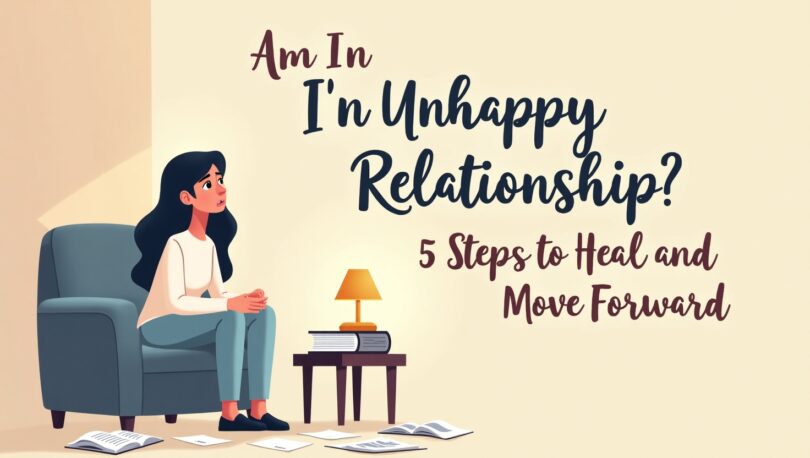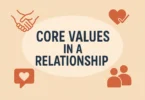Relationships are meant to bring joy, support, and companionship, but what happens when they start feeling more like a burden than a source of happiness? If you often find yourself feeling drained, unheard, or unappreciated, you might be in an unhappy relationship . Many people struggle with identifying whether their relationship is truly unhealthy or just going through a rough patch.
Recognizing the signs of an unhappy relationship is the first step toward healing. Whether the issue stems from poor communication, constant conflicts, or unmet emotional needs, there is always a way to move forward—either by improving the relationship or making the tough decision to walk away.
In this post, we’ll explore five crucial steps to help you heal, rebuild emotional well-being, and regain happiness. Whether you want to fix your relationship or find the strength to leave, these steps will guide you toward a healthier, more fulfilling future.
Headlines
3 Signs You Are in an Unhappy Relationship
- Lack of Communication and Emotional Disconnection
- Constant Conflicts and Unresolved Issues
- Feeling Drained and Unappreciated
Why Do Relationships Become Unhappy?
- Unmet Emotional Needs and Expectations
- External Stress and Life Challenges
- Toxic Patterns and Unhealthy Boundaries
5 Steps to Heal from Unhappy Relationship and Move Forward
- Acknowledge and Accept the Pain
- Set Healthy Boundaries with Your Ex or Former Partner
- Reflect on the Lessons Learned
- Focus on Self-Care and Personal Growth
- Open Yourself to New Possibilities
3 Signs You Are in an Unhappy Relationship
1- Lack of Communication and Emotional Disconnection
Communication is the foundation of any healthy relationship. When communication starts to break down, misunderstandings, resentment, and emotional distance can quickly take over. In unhappy relationship, partners often struggle to express their feelings openly or feel unheard when they try.
How Poor Communication Leads to Misunderstandings
In a thriving relationship, both partners should feel safe to share their thoughts, concerns, and emotions without fear of judgment or conflict. However, in an unhappy relationship:
- Conversations often turn into arguments instead of constructive discussions.
- One or both partners may avoid discussing important issues to prevent conflict.
- There’s a lack of interest in each other’s daily lives, thoughts, and emotions.
- Partners may communicate only about responsibilities (e.g., bills, chores) but avoid deeper emotional conversations.
Over time, unresolved miscommunications lead to frustration and a growing emotional gap. One partner may feel like they are always being misunderstood, while the other may feel like they are constantly being criticized.
Signs of Emotional Withdrawal in Relationships
Emotional connection is just as important as physical intimacy in a relationship. When this connection weakens, partners begin to feel lonely, even when they are together. Here are some common signs of emotional disconnection:
- Lack of affection: Hugs, kisses, and small gestures of love start to disappear.
- Reduced quality time: Conversations feel forced, and spending time together becomes an obligation rather than something enjoyable.
- Feeling unimportant: One or both partners may feel neglected or unappreciated.
- No emotional support: In a healthy relationship, partners turn to each other for comfort. When emotional disconnection sets in, they may start seeking support elsewhere.
- Avoiding deep conversations: Conversations stay on the surface, and there is no desire to discuss dreams, fears, or emotions.
What Causes Communication Breakdown?
Several factors contribute to a breakdown in communication, including:
- Busy schedules and stress that make it hard to prioritize meaningful conversations.
- Unresolved past conflicts that create emotional barriers between partners.
- Fear of vulnerability, leading one or both partners to shut down emotionally.
- Different communication styles, making it hard to express feelings effectively.
How to Rebuild Communication and Emotional Connection
If you recognize these signs in your relationship, don’t lose hope—communication can be improved with effort from both partners. Here are a few steps to reconnect:
- Practice active listening: Focus on understanding your partner’s emotions rather than just responding.
- Express your needs clearly: Instead of blaming, use “I” statements (e.g., “I feel lonely when we don’t spend time together” instead of “You never make time for me”).
- Schedule uninterrupted time to talk: Set aside time each day to check in with each other.
- Seek professional help if needed: Relationship counseling can help improve communication patterns.
2- Constant Conflicts and Unresolved Issues
Every relationship experiences disagreements, but when conflicts become a daily occurrence or remain unresolved, they can turn a relationship into a constant source of stress and unhappiness. Frequent arguments often stem from deeper issues, such as unmet emotional needs, lack of trust, or unresolved past conflicts. If left unaddressed, these issues can create resentment, emotional exhaustion, and even push partners further apart.
The Cycle of Repeated Arguments
In an unhappy relationship, conflicts often follow a predictable and unhealthy pattern. These recurring arguments usually arise from the same underlying issues but never truly get resolved. The cycle often looks like this:
- Trigger Event: A disagreement or misunderstanding sparks an argument (e.g., feeling unappreciated, financial stress, parenting conflicts).
- Escalation: The discussion turns into a heated exchange, with raised voices, blame, or criticism.
- Emotional Shutdown: One or both partners withdraw emotionally, leading to avoidance or silent treatment.
- Temporary Peace: The argument ends without a real resolution, often due to exhaustion or one partner giving in.
- Resurfacing of Issues: Since the core problem wasn’t addressed, similar conflicts arise again in the future.
This cycle leads to frustration, emotional detachment, and growing resentment over time. It also creates a negative atmosphere where both partners feel like they are constantly walking on eggshells.
When Small Issues Turn into Big Problems
One of the key characteristics of an unhappy relationship is how small disagreements can spiral into major fights. This happens due to:
- Unresolved past conflicts: Arguments often bring up old wounds that were never truly healed.
- Lack of effective communication: Instead of discussing issues calmly, partners resort to blame, criticism, or defensiveness.
- Emotional baggage: Stress from outside factors (work, family, financial struggles) adds pressure, making small issues feel bigger.
- Different conflict resolution styles: One partner may want to resolve issues immediately, while the other prefers to avoid confrontation, causing frustration on both sides.
For example, a disagreement about forgetting to take out the trash may not actually be about the chore itself but rather about deeper feelings of being unappreciated or unheard.
The Impact of Unresolved Conflicts on a Relationship
When conflicts go unresolved, they create lasting damage to the relationship, including:
- Increased resentment: Negative feelings build up over time, making it harder to see the good in the relationship.
- Emotional distance: Partners may begin to withdraw from each other, leading to a loss of intimacy and connection.
- Loss of trust: Constant arguing and unresolved issues weaken trust and make partners feel emotionally unsafe.
- Toxic environment: The relationship becomes more about surviving conflicts rather than enjoying each other’s company.
How to Break the Cycle and Resolve Conflicts Effectively
If constant conflicts are making your relationship unhappy, here are steps to break the cycle and work toward resolution:
1. Identify the Root Cause of Conflicts
- Ask yourself: Are we really arguing about this, or is there a deeper issue?
- Recognize patterns in your arguments—are the same frustrations resurfacing?
2. Use Healthy Communication Techniques
- Practice active listening: Instead of thinking about how to respond, focus on truly understanding your partner’s perspective.
- Avoid blame and criticism: Use “I” statements to express feelings (e.g., “I feel hurt when…” instead of “You always make me feel this way”).
- Stay calm: Take a break if emotions escalate, then return to the conversation with a clear mind.
3. Find Common Ground and Compromise
- Work as a team rather than viewing each other as opponents.
- Identify solutions that satisfy both partners instead of focusing on who is “right” or “wrong.”
4. Let Go of Past Resentment
- Holding onto past arguments only fuels negativity—focus on healing and moving forward.
- If needed, seek couples therapy to work through deeper issues
3- Feeling Drained and Unappreciated
A happy and fulfilling relationship should provide emotional support, comfort, and a sense of partnership. However, when one or both partners start feeling constantly drained or unappreciated, the relationship can become a source of stress rather than joy. This emotional exhaustion often leads to resentment, withdrawal, and a growing sense of dissatisfaction.
Feeling drained in a relationship doesn’t necessarily mean that love is gone—it may indicate unmet emotional needs, lack of reciprocity, or an imbalance in effort. Recognizing the signs early can help prevent further emotional damage and guide you toward healing.
Signs Your Relationship Is Emotionally Exhausting
- You’re Always Giving but Receiving Little in Return
- You put in effort to make your partner happy, but they don’t reciprocate.
- You feel like you’re the one constantly making compromises or sacrifices.
- There’s an imbalance in emotional support—you’re there for them, but they don’t show up for you.
- You Feel Unappreciated or Taken for Granted
- Your efforts, whether big or small, go unnoticed or unacknowledged.
- Your partner rarely expresses gratitude or acknowledges the things you do.
- Acts of kindness or affection are expected rather than appreciated.
- Conversations Leave You Feeling Worse Instead of Better
- Your partner dismisses your concerns or doesn’t seem interested in your thoughts.
- Instead of feeling heard and understood, you leave conversations feeling frustrated or invalidated.
- Constructive discussions often turn into criticisms or arguments.
- You’re Emotionally and Physically Drained
- You feel exhausted, even when spending time with your partner.
- The relationship feels more like an obligation than a source of happiness.
- Stress from the relationship spills into other areas of your life (e.g., work, friendships, personal well-being).
- Affection and Intimacy Have Decreased
- Physical affection, compliments, and meaningful gestures are rare.
- You feel emotionally disconnected even when you’re together.
- You question whether your partner truly values you.
Why Does This Happen? Common Causes of Feeling Drained and Unappreciated
Several factors contribute to emotional exhaustion and feelings of neglect in a relationship:
- Lack of emotional reciprocity: One partner consistently gives more while the other takes.
- Unspoken expectations: When partners assume the other should know what they need without communicating.
- Stress and external pressures: Work stress, financial burdens, or personal struggles can make a partner emotionally unavailable.
- Emotional neglect: Over time, partners may stop prioritizing each other’s emotional needs.
- Toxic patterns: Gaslighting, manipulation, or dismissiveness can make one partner feel undervalued.
Understanding the root cause is essential to addressing the issue and finding a solution.
How to Rebuild Appreciation and Emotional Balance
If you’re feeling drained and unappreciated in your relationship, there are steps you can take to restore balance and reconnect with your partner.
1. Express Your Feelings Clearly
- Instead of bottling up emotions, openly communicate how you feel.
- Use “I” statements, such as “I feel unappreciated when my efforts go unnoticed.”
- Avoid blaming—focus on expressing what you need to feel valued.
2. Set Healthy Boundaries
- If you feel like you’re giving too much, establish boundaries to prevent emotional exhaustion.
- Learn to say no to things that make you feel overextended without guilt.
- Prioritize self-care and make sure your own emotional needs are met.
3. Encourage Mutual Effort and Appreciation
- Relationships thrive when both partners contribute equally.
- Small gestures of appreciation—like a thank-you note, a compliment, or an act of kindness—can go a long way.
- Discuss ways you both can show gratitude more often.
4. Reignite Emotional Connection
- Schedule quality time together without distractions.
- Engage in meaningful conversations beyond daily responsibilities.
- Find activities that bring joy and strengthen your bond.
5. Know When to Walk Away
- If your efforts to communicate and rebuild appreciation are consistently ignored, it may be time to reconsider the relationship.
- A healthy relationship should not feel one-sided or constantly draining.
- Seeking professional help, such as relationship counseling, can provide guidance on whether to stay or move on.
Why Do Relationships Become Unhappy?
1- Unmet Emotional Needs and Expectations
Every individual has specific emotional needs in a relationship—whether it’s affection, support, understanding, or companionship. When these needs are not met, it can lead to feelings of dissatisfaction, loneliness, and frustration. Unmet emotional needs are often at the core of an unhappy relationship, and if they persist, they can create a deep sense of emotional disconnection between partners.
In addition to unmet needs, unrealistic expectations can further strain the relationship. If one partner expects the other to fulfill every emotional need without communicating those needs, or if expectations are set too high, disappointment is almost inevitable. This creates a cycle of dissatisfaction that leaves both partners feeling unfulfilled.
What Are Emotional Needs in a Relationship?
Emotional needs are the basic desires or requirements we have for healthy emotional connections in relationships. These needs can vary from person to person, but here are some common emotional needs in a relationship:
- Affection and Physical Touch: Most people need affection, whether it’s holding hands, hugging, or simply being close. Physical touch fosters connection and reinforces emotional intimacy.
- Love and Appreciation: Feeling loved, valued, and recognized is fundamental to human well-being. When one partner doesn’t show affection or appreciation, the other can feel neglected.
- Validation and Understanding: Every individual wants to be heard, understood, and validated. Emotional validation comes from being listened to without judgment, which helps partners feel seen and valued.
- Security and Trust: Emotional security and trust are essential to a stable relationship. This includes feeling safe to express oneself and knowing that your partner will be supportive, especially during tough times.
- Companionship and Emotional Support: Having someone to share life’s joys and challenges with is a key emotional need. Emotional support involves providing comfort, encouragement, and reassurance in times of stress or difficulty.
When one partner’s emotional needs are consistently unmet, it leads to feelings of isolation and emotional hunger. (Unhappy Relationship)
How Unmet Emotional Needs Lead to Unhappiness
Unmet emotional needs create significant emotional voids in a relationship, which can manifest in various ways:
- Emotional Distance: When partners don’t feel supported or valued, they may withdraw emotionally. This can create a sense of isolation, where one partner feels like they’re navigating life alone, even within the relationship.
- Resentment and Frustration: Over time, unmet emotional needs can lead to resentment. One partner may start to feel that they are giving more than they are receiving, leading to feelings of bitterness and frustration.
- Lack of Intimacy: Without emotional closeness, physical intimacy often suffers as well. Emotional disconnection can make sexual intimacy feel mechanical, disconnected, or forced.
- Loss of Trust: If one partner continually fails to meet emotional needs (even unknowingly), the other might start to feel mistrust or doubt their commitment to the relationship.
- Growing Dissatisfaction: When emotional needs are consistently unmet, one or both partners may begin questioning the relationship’s worth, leading to greater unhappiness and dissatisfaction.
How Unrealistic Expectations Can Amplify Emotional Disconnection
In addition to unmet needs, unrealistic expectations can also damage a relationship. This occurs when one partner holds expectations that are either too high or unclear, leaving the other partner feeling inadequate or incapable of meeting those needs.
Common examples of unrealistic expectations in relationships include:
- Expecting your partner to fulfill all of your emotional needs (i.e., the idea that one person should be your everything—best friend, therapist, lover, etc.).
- Believing that love should always feel exciting and passionate, without considering that relationships naturally go through ups and downs.
- Assuming your partner should know exactly what you need without you communicating it.
- Holding unrealistic standards for your partner’s behavior, such as always being available, making no mistakes, or constantly agreeing with you.
These expectations create a setup for disappointment. When one partner feels like they cannot live up to the other’s standards, it leads to guilt, frustration, and emotional distance.
How to Address Unmet Emotional Needs and Unrealistic Expectations
If you find that unmet emotional needs and unrealistic expectations are affecting your relationship, there are steps you can take to address them. Here’s how you can begin the healing process:
1. Identify and Communicate Your Emotional Needs
- Start by identifying your own emotional needs. Ask yourself, What makes me feel loved, supported, and valued?
- Share these needs with your partner in a calm and non-accusatory manner. Use “I” statements to avoid sounding like you’re blaming them (e.g., “I feel really appreciated when you make an effort to spend quality time with me.”).
- Be specific about what you need, whether it’s more affection, emotional support, or better communication.
2. Set Realistic Expectations for Each Other
- Reevaluate your expectations and ask yourself if they are reasonable. Are you expecting too much from your partner, or are you not being clear enough about your needs?
- Remember, your partner is a human being with their own limitations, and expecting them to meet all your emotional needs can place unnecessary pressure on the relationship.
- Instead, aim for mutual understanding and compromise—realistic expectations are grounded in what’s practical and achievable.
3. Make Efforts to Meet Each Other’s Emotional Needs
- Be proactive about meeting your partner’s emotional needs. It’s not just about asking for what you need but also being mindful of how your actions affect them.
- Show love, appreciation, and support through consistent actions, whether it’s a compliment, a thoughtful gesture, or simply listening when they need to talk.
- Be patient and understanding—recognize that fulfilling emotional needs is a continual process, not a one-time effort.
4. Seek Relationship Counseling if Necessary
- If there’s a persistent gap in emotional needs or if expectations feel impossible to bridge, it may be helpful to seek couples therapy.
- A trained therapist can help facilitate open communication, teach conflict resolution skills, and provide insights into how both partners can better meet each other’s needs.
Final Thoughts
Unmet emotional needs and unrealistic expectations can create a rift in relationships, leaving both partners feeling unhappy and disconnected. However, by identifying your emotional needs, communicating them effectively, and adjusting unrealistic expectations, you can rebuild the connection and bring balance back into your relationship. Relationships require work, but with the right effort and understanding, they can thrive even through challenging times. (Unhappy Relationship)
2- External Stress and Life Challenges
External stress and life challenges are inevitable parts of life, but when they enter a relationship, they can strain the emotional bond between partners. Whether it’s work-related stress, financial problems, family issues, or health concerns, external pressures can take a toll on the emotional and mental well-being of individuals. In relationships, these stressors may not only affect the person experiencing them but can also impact the dynamics between partners, leading to tension, conflict, and feelings of emotional disconnection.
When life challenges go unaddressed, they can lead to a build-up of unresolved issues and create an environment where both partners feel overwhelmed, unsupported, and frustrated. Understanding how to manage external stress and recognizing its impact on the relationship can help couples navigate through difficult times and maintain a healthy bond.
How External Stress Affects Relationships
- Increased Tension and Conflict
- Stressful situations, especially those involving financial difficulties or work pressures, can increase irritability and frustration. Partners may snap at each other more easily or have short tempers because they are overwhelmed.
- Everyday issues, like household chores or communication, can be magnified under stress. When one or both partners feel constantly on edge, even small disagreements can turn into major arguments.
- Emotional Withdrawal
- When facing external stress, one or both partners may begin to withdraw emotionally. They might feel mentally exhausted and unable to provide the emotional support the other person needs.
- This withdrawal can lead to feelings of loneliness or neglect. In some cases, a partner may not even recognize that they are emotionally distancing themselves.
- Decreased Intimacy and Affection
- Stress often leads to a decline in physical and emotional intimacy. Couples may find it difficult to connect on a deeper level when they are distracted by worries and obligations outside of the relationship.
- The emotional strain of external challenges can reduce affection, physical touch, and romantic gestures, which are essential for maintaining closeness and intimacy.
- Impaired Communication
- When stress levels are high, clear communication becomes more difficult. People are less patient, more defensive, and less inclined to listen. Instead of having constructive conversations, discussions may escalate into blame or criticism.
- Misunderstandings become more common when one partner is distracted by external pressures, leading to frustration and feelings of being unheard or misunderstood.
- Increased Focus on Problem-Solving Rather Than Relationship Needs
- When external challenges are significant, like a financial crisis or a family health issue, both partners may become hyper-focused on solving the problem at hand. This can cause them to neglect the emotional needs of the relationship.
- The relationship itself may take a backseat to immediate, pressing concerns, leaving both partners feeling disconnected or like they are living in survival mode rather than enjoying the partnership.
Common External Stressors That Impact Relationships
Several life challenges can contribute to relationship stress. Here are some common ones:
- Financial Strain: Job loss, debt, or financial instability can create significant pressure on individuals and couples. The stress of trying to make ends meet can lead to arguments, resentment, and emotional fatigue.
- Work-Related Stress: Long hours, job dissatisfaction, or work-related pressure can create a sense of burnout, leaving one or both partners feeling emotionally unavailable.
- Health Issues: Illness, chronic health problems, or caring for a sick loved one can drain emotional and physical energy, leaving partners with little capacity for emotional support in the relationship.
- Family Problems: Conflicts with extended family members, like in-laws or difficult family dynamics, can create tension in the relationship. Parenting struggles or caregiving responsibilities for children or elderly relatives can also cause stress.
- Major Life Changes: Major life events such as moving to a new city, divorce, or the loss of a loved one can trigger emotional turbulence and make it difficult for couples to maintain harmony.
- Social Stressors: Issues such as discrimination, social isolation, or challenges related to friends and social circles can also add external pressure to a relationship.
How to Manage External Stress as a Couple
While external stressors are inevitable, couples can take proactive steps to manage them together, reducing their negative impact on the relationship. Here are some strategies to cope with external stress and life challenges:
1. Open Communication and Emotional Support
- It’s crucial to maintain open lines of communication when external stress is high. Talk about the challenges you’re facing, whether they’re personal or financial, and let your partner know how you feel.
- Offer emotional support by listening without judgment. Sometimes, just being there for each other—acknowledging the stress and validating each other’s feelings—can strengthen the relationship.
- Be patient with each other. Understand that stress can affect mood and behavior, and try not to take things personally when your partner is irritable or withdrawn.
2. Divide Responsibilities and Work Together
- When external stress is significant, it can be overwhelming to handle everything alone. Work together as a team to divide responsibilities—whether it’s managing finances, dealing with household chores, or caring for family members.
- Share the burden and avoid the “I’ll do it all” mentality. Supporting each other in practical ways shows that you’re a united front in tackling life’s challenges.
3. Prioritize Self-Care and Personal Well-Being
- Stress can take a toll on both mental and physical health. Make sure that you and your partner are both taking time for self-care. This could mean taking breaks, exercising, getting enough sleep, or pursuing activities that help recharge your energy.
- Encourage each other to focus on your individual well-being, which will ultimately help you both handle stress better and strengthen the relationship.
4. Schedule Quality Time Together
- In the midst of external pressures, it’s easy to lose sight of the relationship itself. Be intentional about carving out time for connection. Whether it’s a regular date night or simply watching a movie together, scheduling quality time ensures that you’re nurturing your bond despite the stress.
- Use this time to talk about things unrelated to stress, like hobbies, dreams, or lighthearted topics that bring joy and laughter.
5. Seek Professional Help if Necessary
- Sometimes, external stressors can feel overwhelming, and couples may struggle to cope with them on their own. In such cases, seeking couples counseling or therapy can provide support and help couples navigate difficult times.
- A therapist can help identify patterns of behavior, teach healthy coping mechanisms, and guide couples in rebuilding connection during times of stress.
Final Thoughts
External stress and life challenges can put a significant strain on a relationship, but they don’t have to break it. By communicating openly, providing emotional support, and working together as a team, couples can navigate through even the most difficult times. It’s important to remember that relationships are a partnership, and facing challenges together can strengthen the emotional bond. Taking the necessary steps to prioritize the relationship during stressful times will help ensure that the connection remains strong, even when life feels overwhelming. (Unhappy Relationship)
3- Toxic Patterns and Unhealthy Boundaries
Toxic patterns and unhealthy boundaries can significantly undermine a relationship, leading to feelings of frustration, resentment, and emotional distress. These patterns are often deeply ingrained behaviors that can emerge over time in a relationship, causing emotional harm and preventing both partners from thriving in a healthy, supportive dynamic. Unhealthy boundaries further exacerbate these issues, making it difficult for individuals to feel respected, heard, and valued within the relationship.
Toxic behaviors and unhealthy boundaries can take many forms, ranging from manipulation and control to a lack of personal space and respect for each other’s needs. These issues often stem from unresolved emotional wounds, negative relationship dynamics, or a lack of understanding about healthy relationship principles. The key to breaking free from these patterns is recognizing them early and taking active steps to create a healthier, more balanced partnership.
What Are Toxic Patterns in Relationships?
Toxic patterns are recurring, harmful behaviors or interactions between partners that lead to emotional pain, dysfunction, and an overall unhealthy dynamic. They often involve manipulation, emotional abuse, control, dishonesty, or a lack of respect for one another’s emotional well-being. Here are some common toxic patterns in relationships:
- Manipulation and Gaslighting
- Gaslighting is a form of psychological manipulation where one partner tries to make the other question their reality or perception. It involves denying events or feelings, twisting facts, or making the other partner feel crazy or irrational.
- Manipulation can take other forms, such as guilt-tripping, emotional blackmail, or playing the victim to control the partner’s behavior.
- Constant Criticism and Dismissiveness
- One partner may habitually criticize or belittle the other, undermining their self-esteem and causing emotional harm. This can include name-calling, harsh judgments, or focusing on flaws rather than offering constructive feedback.
- Dismissing your partner’s feelings or thoughts, especially in situations where they are seeking emotional support, can erode trust and intimacy.
- Control and Possessiveness
- In some relationships, one partner may attempt to control the other’s actions, decisions, or social interactions. This can include dictating what the other wears, where they go, who they talk to, and how they spend their time.
- Possessiveness can extend to controlling finances, friendships, or even career choices, leaving the other partner feeling trapped or disempowered.
- Avoidance and Emotional Withdrawal
- Emotional withdrawal occurs when one partner consistently shuts down, avoids difficult conversations, or becomes emotionally distant. This can leave the other partner feeling unsupported, isolated, and rejected.
- Avoiding important issues or refusing to engage in conflict resolution can result in unresolved problems that fester and create long-term emotional damage.
- Excessive Dependence or Enmeshment
- Excessive dependence refers to one partner relying too heavily on the other for emotional or financial support, leaving the relationship unbalanced.
- Enmeshment occurs when partners become too emotionally entangled, losing their sense of individuality or boundaries. This can lead to unhealthy levels of control, guilt, or a lack of personal autonomy.
What Are Unhealthy Boundaries in Relationships?
Boundaries are essential in any relationship. They define personal limits, protect emotional well-being, and establish mutual respect between partners. Unhealthy boundaries, on the other hand, allow one partner to overstep these limits, creating a sense of imbalance and undermining personal autonomy. Here are some common examples of unhealthy boundaries:
- Lack of Personal Space and Independence
- In relationships, both partners should be able to maintain their sense of individuality and independence. Unhealthy boundaries might involve one partner demanding constant attention, constantly needing to be in each other’s presence, or attempting to control where the other goes and who they interact with.
- A lack of personal space can lead to emotional burnout, resentment, and a loss of self-identity.
- Disrespecting Emotional Needs and Limits
- An unhealthy boundary is when one partner dismisses or invalidates the emotional needs of the other. For example, when one partner consistently ignores the other’s request for space or support or insists on discussing sensitive topics at inappropriate times.
- Partners should respect each other’s emotional needs and recognize when it’s necessary to pause conversations or provide reassurance.
- Over-Functioning and Under-Functioning
- Over-functioning happens when one partner takes on excessive responsibilities and does too much for the other, often because the other partner under-functions or avoids responsibility.
- This imbalance can lead to resentment and a sense of injustice in the relationship, as one partner may feel overwhelmed while the other feels underappreciated or neglected.
- Lack of Respect for Personal Boundaries
- A fundamental aspect of healthy relationships is respecting each other’s personal boundaries. This might involve not pushing a partner into situations they’re uncomfortable with, not violating their privacy, or not ignoring their requests for emotional support.
- Unhealthy boundaries might include pressuring a partner to reveal personal information they’re not ready to share, or continuously disregarding their need for space or quiet time.
The Impact of Toxic Patterns and Unhealthy Boundaries
Toxic patterns and unhealthy boundaries erode the trust, intimacy, and respect necessary for a healthy relationship. Over time, they can lead to:
- Emotional Burnout: One or both partners may begin to feel emotionally drained and depleted as they constantly navigate unhealthy dynamics.
- Loss of Self-Esteem: Repeated criticism, manipulation, and invalidation can diminish a person’s self-worth and confidence, making them feel like they are never good enough.
- Resentment and Frustration: When boundaries are violated or toxic behaviors persist, feelings of anger, frustration, and resentment can build up. These emotions may eventually lead to emotional withdrawal or a complete breakdown in communication.
- Deteriorating Intimacy: Physical and emotional intimacy may suffer when toxic behaviors or boundary violations are present. Partners may stop trusting each other, leading to a lack of closeness and affection.
- Breakdown in Communication: Toxic patterns often involve poor communication, which makes it difficult for partners to express their needs, desires, or concerns in a healthy way.
How to Break Free from Toxic Patterns and Establish Healthy Boundaries
Breaking free from toxic patterns and unhealthy boundaries requires intentional effort, self-awareness, and commitment from both partners. Here are some steps you can take to address these issues:
1. Recognize and Acknowledge Toxic Behaviors
- The first step in breaking toxic patterns is recognizing them. Reflect on the relationship and identify harmful behaviors—whether it’s manipulation, constant criticism, or emotional withdrawal.
- Acknowledge how these behaviors affect both you and your partner. Self-awareness is key to breaking free from harmful cycles.
2. Open Communication and Setting Boundaries
- Have an open and honest conversation about the toxic behaviors you’ve noticed and how they affect the relationship. Use “I” statements to avoid sounding accusatory (e.g., “I feel hurt when you dismiss my feelings during arguments.”).
- Establish clear, healthy boundaries for emotional and physical space, privacy, and respect. Make sure both partners agree on these boundaries and hold each other accountable.
3. Seek Professional Help if Needed
- Breaking free from toxic patterns can be challenging, especially if they’ve become deeply ingrained in the relationship. Couples therapy can help both partners understand the root causes of these behaviors and provide guidance on healthier ways of interacting.
- A therapist can help identify destructive patterns, teach effective communication skills, and work through the underlying issues that contribute to toxic behaviors.
4. Prioritize Mutual Respect and Support
- Healthy relationships are built on mutual respect, support, and understanding. Make a conscious effort to validate each other’s feelings, listen attentively, and respect personal boundaries.
- Encourage each other to express needs and desires without fear of judgment, and work together to create a safe space for open, honest communication.
Final Thoughts
Toxic patterns and unhealthy boundaries can significantly damage a relationship if left unaddressed. Recognizing these behaviors and actively working to break free from them can pave the way for a healthier, more balanced connection. With clear communication, respect for personal space, and mutual support, couples can rebuild trust, restore emotional intimacy, and create a relationship that fosters growth and happiness for both partners. (Unhappy Relationship)
5 Steps to Heal and Move Forward
Healing from an unhappy or toxic relationship requires a deliberate process of self-reflection, emotional healing, and active steps to create a healthier future, both for oneself and in future relationships. Moving forward involves not only addressing the wounds and challenges experienced in the relationship but also taking personal responsibility for one’s emotional well-being. The goal is to emerge stronger, wiser, and more capable of cultivating healthy, fulfilling relationships in the future. Here are five essential steps to heal and move forward:
1. Acknowledge and Accept the Pain of Unhappy Relationship
Healing begins with acceptance. The first step in moving forward from an unhappy relationship is to acknowledge the pain you are experiencing. This involves recognizing that the relationship was harmful or unfulfilling, accepting the emotions associated with it (such as grief, anger, betrayal, or sadness), and giving yourself permission to feel those emotions.
- Recognizing the Pain: Denying or suppressing painful emotions can prolong the healing process. It’s important to let yourself grieve the loss of the relationship and any unmet expectations you may have had. Whether it’s the end of a romantic relationship, the loss of a friendship, or the breakdown of trust, acknowledging the pain is crucial.
- Allow Yourself to Heal: Healing takes time, and it’s okay to feel vulnerable or unsettled. Recognize that emotional wounds from an unhappy relationship don’t heal overnight, but with patience and self-compassion, they will heal.
- Release the Guilt or Self-Blame: It’s easy to fall into the trap of self-blame, but healing involves forgiving yourself. Whether the relationship ended due to mistakes on your part or because of toxic behaviors in your partner, it’s important to release any feelings of guilt or regret.
2. Set Healthy Boundaries with Your Ex or Former Partner
Setting boundaries is an essential part of healing and moving forward after an unhappy relationship. Maintaining healthy boundaries prevents further emotional harm and gives you the space you need to heal without interference from your ex-partner or anyone involved in the relationship.
- No Contact or Limited Contact: Depending on the nature of the relationship, it may be helpful to cut off or limit contact with your ex. This allows both of you the space to heal without being reminded of past conflicts or unresolved emotions. It may be hard at first, but establishing physical and emotional distance can promote healing.
- Clear Emotional Boundaries: Even if you must maintain communication for logistical reasons (such as co-parenting or shared responsibilities), it’s essential to establish emotional boundaries. This may involve limiting conversations to neutral topics and resisting the urge to engage in emotional discussions that bring up painful memories.
- Reaffirm Your Own Identity: Reestablishing boundaries also means reclaiming your sense of self outside of the relationship. Spend time rediscovering your passions, hobbies, and the things that bring you joy and fulfillment, without any need for external validation.
3. Reflect on the Lessons Learned
The third step to healing is taking the time to reflect on the relationship and the lessons it has taught you. While painful, every relationship, even an unhappy or toxic one, offers valuable insights that can help you grow and avoid repeating the same mistakes in the future.
- Identify Patterns and Red Flags: Reflecting on the relationship allows you to identify toxic patterns or behaviors that may have led to unhappiness. Did you ignore red flags? Were there signs of emotional manipulation, lack of communication, or unhealthy dependency? Understanding these patterns helps you recognize them in future relationships.
- Understand Your Own Needs and Desires: In the process of healing, it’s important to identify what you need from a partner and a relationship. Did your needs for affection, communication, or support go unmet? Reflect on how you can set clearer expectations for yourself and a future partner.
- Forgive, but Don’t Forget: Learning to forgive the mistakes and flaws of both yourself and your ex-partner is vital for emotional freedom. However, forgiveness doesn’t mean forgetting. Take note of what you’ve learned to ensure you don’t make the same mistakes again.
4. Focus on Self-Care and Personal Growth
Healing from an unhappy relationship is not only about overcoming emotional pain but also about focusing on self-care and personal growth. It’s important to prioritize your own well-being to restore your sense of balance and joy, and to allow yourself to grow from the experience.
- Engage in Self-Care Practices: Self-care encompasses physical, emotional, and mental well-being. Whether it’s getting enough rest, engaging in activities that nourish your soul (like exercise, meditation, or hobbies), or taking time to pamper yourself, focusing on self-care rejuvenates your mind and body after emotional stress.
- Rediscover Your Passions and Interests: When you’re in an unhappy relationship, it’s easy to lose sight of the things that made you happy outside of the relationship. Now is the perfect time to reconnect with your hobbies and interests. Whether it’s travel, art, writing, or spending time with friends, allow yourself to enjoy life again.
- Seek Personal Growth: Take the lessons learned from the relationship and focus on developing yourself as an individual. This could mean learning new skills, pursuing education, building self-confidence, or getting involved in community activities that enhance your sense of purpose.
- Practice Mindfulness and Positive Thinking: Engage in mindfulness techniques to manage negative emotions and foster a positive mindset. Practices such as journaling, meditation, or simply being present in the moment can help you stay grounded and focused on your personal healing journey.
5. Open Yourself to New Possibilities
Once you’ve worked through the pain and healing process, it’s time to open yourself to new possibilities—whether that’s a new relationship, a renewed focus on personal goals, or a fresh perspective on life.
- Take It Slow with Future Relationships: If you’re considering entering another relationship, it’s important to take things slowly. Don’t rush into another partnership out of fear of being alone or wanting validation. Focus on building trust and taking time to get to know someone new before committing. Make sure that you’ve addressed any emotional baggage from the past and are not seeking a new relationship to fill the void left by an unhappy one.
- Embrace New Opportunities for Growth: Now that you’ve learned from your past relationship, you’re in a better position to embrace new opportunities for personal and professional growth. Pursue goals that may have been sidelined during your unhappy relationship, whether that’s advancing your career, exploring new interests, or building new friendships.
- Trust in Your Worth and Future: One of the most important steps to moving forward is rebuilding your sense of self-worth. Remind yourself that your happiness is in your hands. Trust that you deserve a healthy, fulfilling relationship and that the future holds opportunities for love, growth, and personal fulfillment.
Conclusion
Healing from an unhappy relationship is a journey that requires patience, self-compassion, and a willingness to learn from the past. By following these five steps—acknowledging the pain, setting healthy boundaries, reflecting on the lessons learned, focusing on self-care, and opening yourself to new possibilities—you can emerge from the experience stronger, more self-aware, and ready to embrace the future with confidence. Moving forward doesn’t mean forgetting the past; it means using the lessons learned to create a brighter, healthier tomorrow.








Leave a Comment